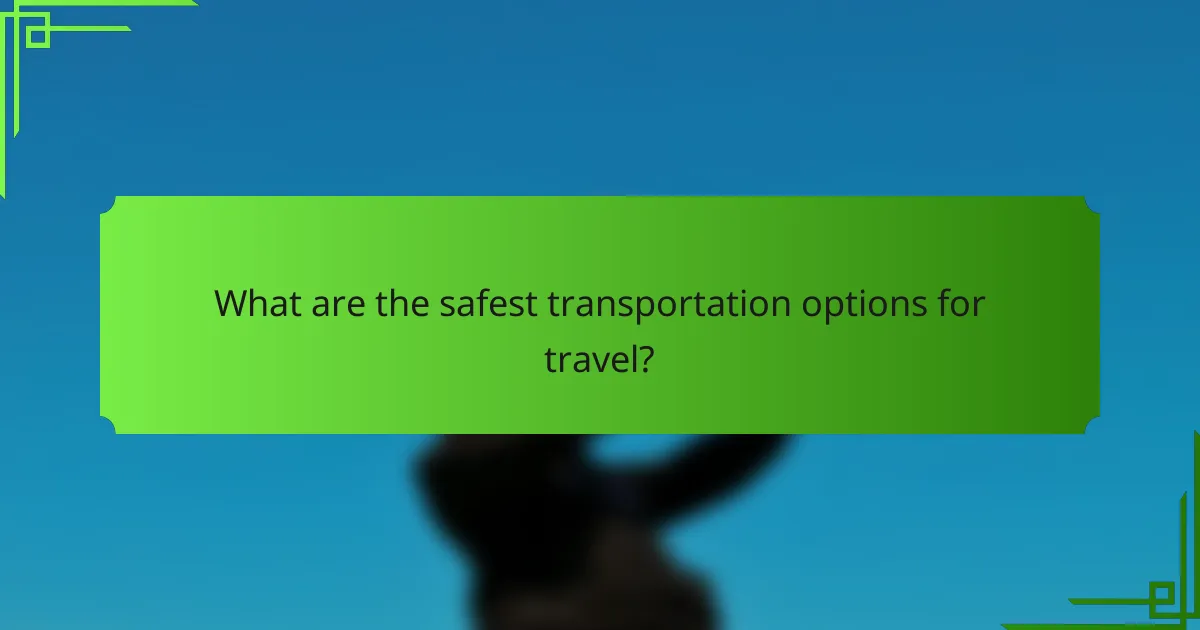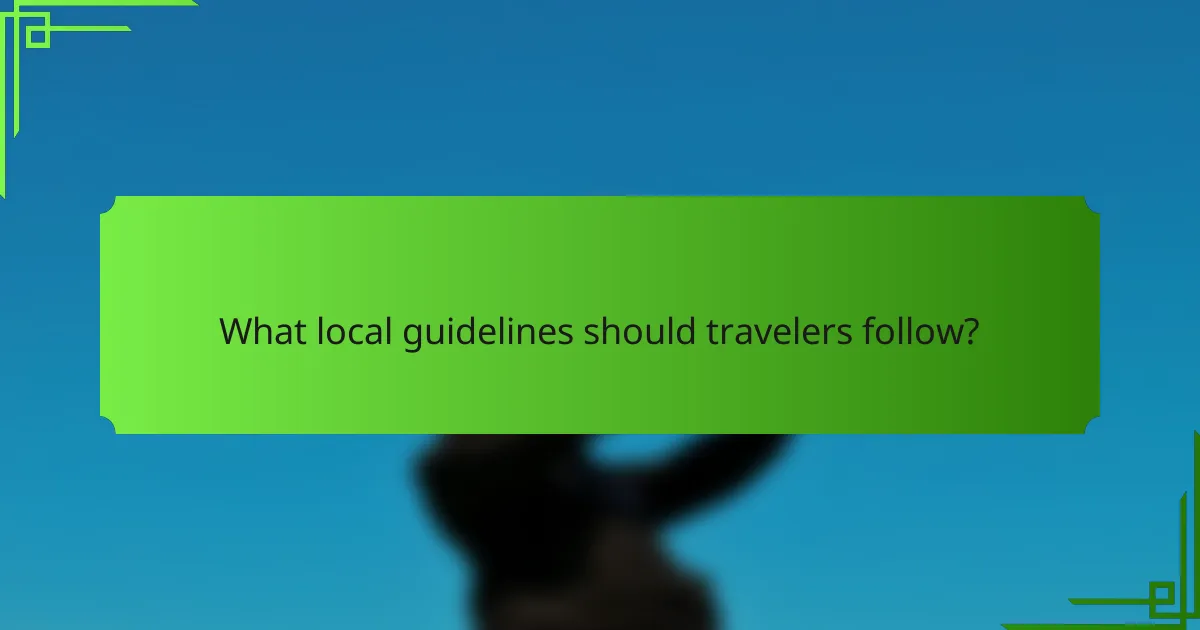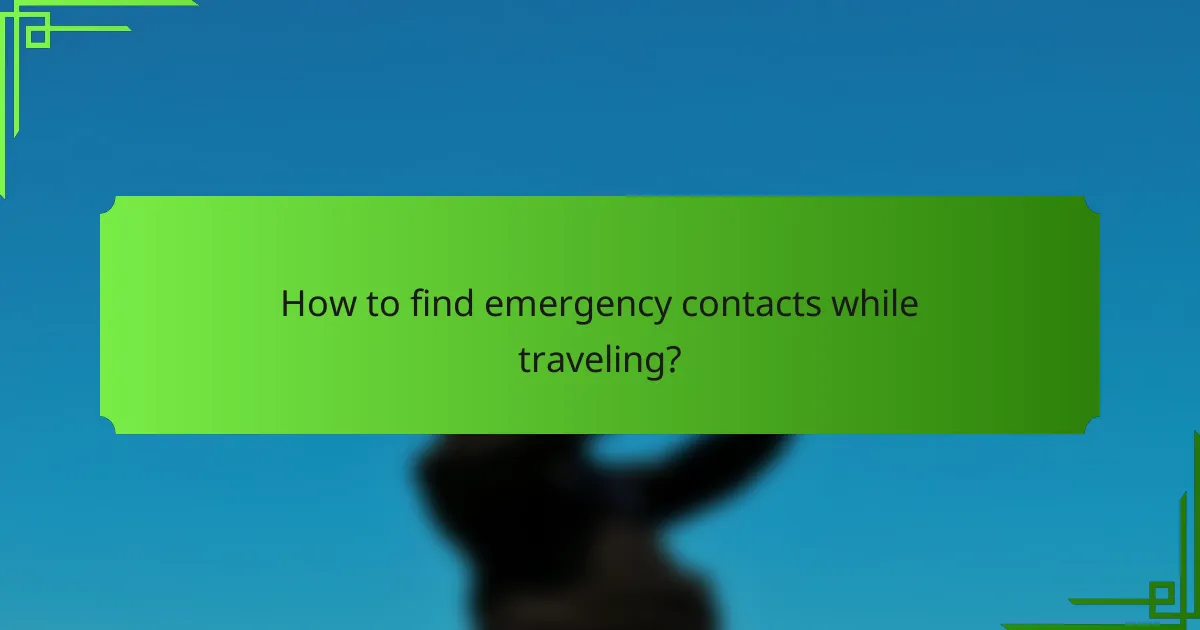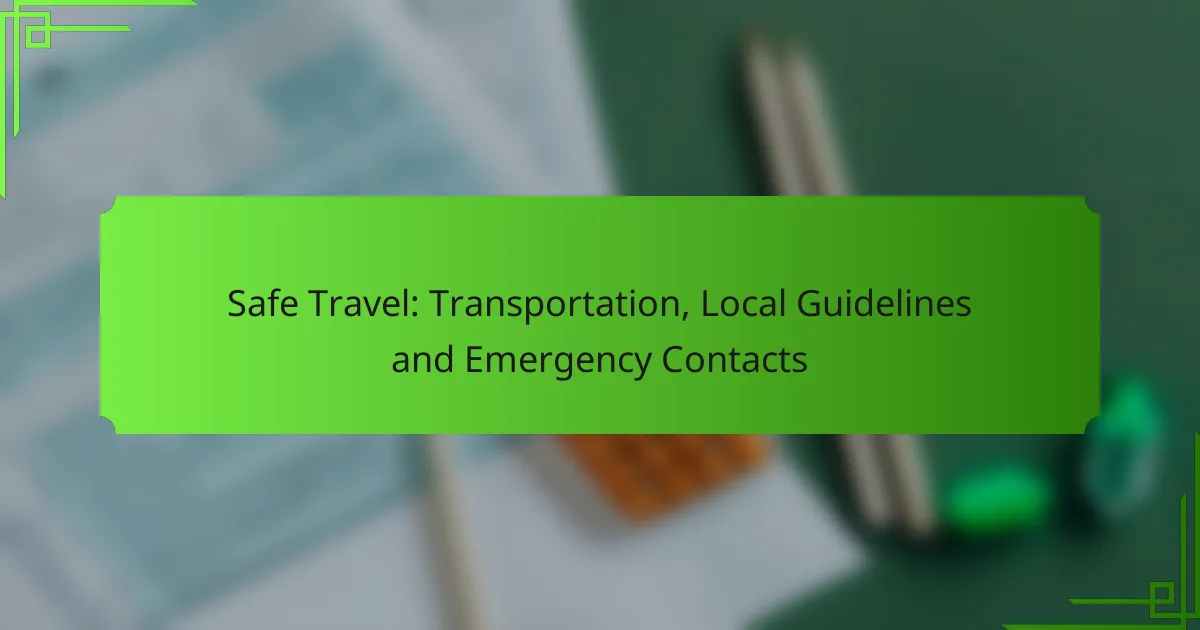When traveling, prioritizing safety is essential, and understanding your transportation options can greatly enhance your experience. Familiarizing yourself with local guidelines and emergency contacts will help you navigate your destination responsibly and effectively. By preparing in advance, you can ensure a smooth journey while respecting cultural norms and knowing where to turn in case of emergencies.

What are the safest transportation options for travel?
The safest transportation options for travel include public transport, rideshare services, rental cars, and taxis, each offering varying levels of safety and convenience. Choosing the right option depends on your destination, budget, and personal comfort with different modes of transport.
Public transport systems in major cities
Public transport systems, such as buses and subways, are often reliable and cost-effective. Major cities typically have extensive networks that can take you to popular destinations quickly.
When using public transport, be aware of peak hours to avoid overcrowding and potential safety issues. Always keep personal belongings secure and stay alert to your surroundings.
Rideshare services like Uber and Lyft
Rideshare services like Uber and Lyft provide convenient door-to-door transportation. These services often have safety features, such as driver ratings and GPS tracking, which enhance security.
To ensure a safe experience, verify the driver’s identity and vehicle details before getting in. Avoid sharing personal information with the driver and consider using the in-app safety features if you feel uncomfortable.
Rental car safety guidelines
Renting a car can offer flexibility, especially in areas with limited public transport. Always choose a reputable rental company and inspect the vehicle for any damage before driving off.
Familiarize yourself with local traffic laws and driving customs, as they can vary significantly. Keep emergency numbers handy and ensure you have a GPS or map to avoid getting lost.
Walking and biking safety tips
Walking and biking are great ways to explore a city, but safety should be a priority. Stick to well-lit areas and pedestrian paths, especially at night.
When biking, wear a helmet and follow traffic signals. Be aware of your surroundings and avoid using headphones, which can distract you from potential hazards.
Traveling by taxi in urban areas
Taxis can be a safe option for transportation in urban areas, especially when public transport is limited. Use licensed taxis and avoid accepting rides from unmarked vehicles.
Before getting in, check that the taxi’s identification matches the information provided by the dispatcher. Keep your belongings close and share your ride details with someone you trust for added safety.

What local guidelines should travelers follow?
Travelers should adhere to local guidelines that encompass health regulations, cultural customs, and emergency protocols to ensure a safe and respectful visit. Understanding these aspects can significantly enhance the travel experience and help avoid misunderstandings or legal issues.
Health regulations for travelers
Health regulations vary by country and may include vaccination requirements, health screenings, or specific medical documentation. Travelers should check the official health department website of their destination for the latest updates and requirements.
For example, some countries may require proof of vaccination against diseases like yellow fever or hepatitis A. It’s advisable to carry a copy of vaccination records and consult with a healthcare provider before traveling.
Local customs and etiquette
Understanding local customs and etiquette is crucial for respectful interactions. Each culture has its own set of norms regarding greetings, dining, and dress codes that travelers should familiarize themselves with.
For instance, in many Asian countries, it is customary to bow slightly when greeting someone, while in Western cultures, a firm handshake is more common. Observing local practices can foster goodwill and enhance social interactions.
COVID-19 restrictions and requirements
COVID-19 restrictions are still in place in many regions, affecting travel protocols such as mask mandates, social distancing, and entry requirements. Travelers should verify the current regulations specific to their destination before departure.
Some countries may require a negative COVID-19 test result taken within a certain timeframe or proof of vaccination. Staying informed through official government sources can help avoid unexpected issues upon arrival.
Emergency protocols in different regions
Emergency protocols can differ significantly based on the region and local laws. Familiarizing yourself with emergency numbers, such as police, fire, and medical services, is essential for safety.
In many European countries, for example, the emergency number is 112, while in the United States, it is 911. Knowing these numbers and the local procedures for reporting emergencies can be crucial in a crisis situation.

How to find emergency contacts while traveling?
Finding emergency contacts while traveling is crucial for ensuring safety and quick assistance. Start by researching local emergency numbers, embassy contacts, and healthcare facilities before your trip.
Local emergency numbers by country
Each country has its own emergency numbers, typically for police, fire, and medical services. For example, in the United States, dial 911, while in the European Union, 112 is the standard emergency number. It’s advisable to note these numbers down or save them in your phone before traveling.
Additionally, some countries have specific numbers for different services. For instance, in Australia, 000 is used for all emergencies, but 131 444 is designated for non-urgent police assistance. Always check the local guidelines for the country you are visiting.
Embassy contact information
Your country’s embassy can provide vital assistance in emergencies, such as lost passports or legal issues. Before traveling, locate the nearest embassy or consulate and save their contact information, including phone numbers and addresses.
Many embassies also offer emergency services for citizens in distress. It’s beneficial to register your travel plans with your embassy, as this can facilitate quicker assistance in case of emergencies.
Travel insurance emergency assistance
Travel insurance often includes emergency assistance services, which can help with medical emergencies, trip cancellations, or lost belongings. When purchasing insurance, review the coverage details and ensure it includes a 24/7 emergency hotline.
Keep your insurance policy number and contact information handy during your travels. This will allow you to quickly reach out for help if needed, ensuring you receive timely support in critical situations.
Local healthcare facilities
Familiarizing yourself with local healthcare facilities is essential for addressing medical emergencies. Research hospitals and clinics near your accommodation, noting their contact details and hours of operation.
In many countries, private healthcare may be preferred for quicker service, while public facilities might be more cost-effective but slower. Always have a plan for how to reach the nearest facility in case of an emergency.

What are the best practices for safe travel?
To ensure safe travel, prioritize planning, stay informed, and utilize technology. Understanding local guidelines and having emergency contacts readily available can significantly enhance your safety while traveling.
Travel safety checklists
Creating a travel safety checklist helps you prepare for potential risks. Include items such as copies of important documents, emergency contact information, and a list of local hospitals or clinics. Regularly review this checklist before your trip to ensure nothing is overlooked.
Consider including safety items like a first aid kit, personal safety alarms, and travel insurance details. These preparations can mitigate risks and provide peace of mind during your journey.
Staying informed about local news
Staying updated on local news is crucial for safe travel. Use reliable news sources or local government websites to monitor any travel advisories, weather conditions, or safety concerns in your destination. This information can help you avoid areas with civil unrest or natural disasters.
Additionally, consider following local social media accounts or community forums. Engaging with locals can provide real-time insights and tips that may not be covered by mainstream news outlets.
Using travel apps for safety
Travel apps can enhance your safety by providing essential information at your fingertips. Apps like emergency contact locators, navigation tools, and local emergency services can be invaluable in unfamiliar areas. Download these apps before your trip to ensure you have access even without internet connectivity.
Look for apps that offer features such as offline maps, safety alerts, and language translation. These tools can help you navigate challenges and communicate effectively in a foreign environment, enhancing your overall travel experience.

What should travelers know about local laws?
Travelers must be aware of local laws to avoid legal issues during their trips. Each country has its own regulations that can differ significantly from those in travelers’ home countries, making it essential to understand these rules before visiting.
Common legal issues for tourists
Tourists often encounter legal issues related to alcohol consumption, drug laws, and public behavior. For instance, some countries have strict regulations on drinking ages and public intoxication, while others may impose severe penalties for drug possession, even in small amounts.
Another common issue involves photography restrictions, particularly in sensitive areas such as military installations or religious sites. Always check local guidelines to avoid fines or confiscation of equipment.
Understanding local traffic laws is also crucial. For example, in some countries, driving without a valid international driving permit can lead to hefty fines. Familiarize yourself with local driving customs and regulations to ensure a safe travel experience.
